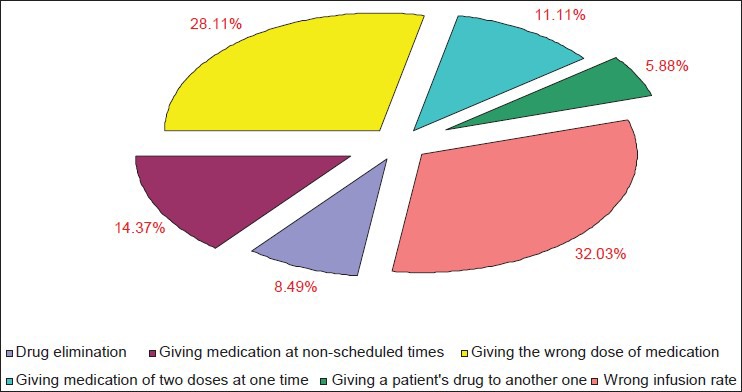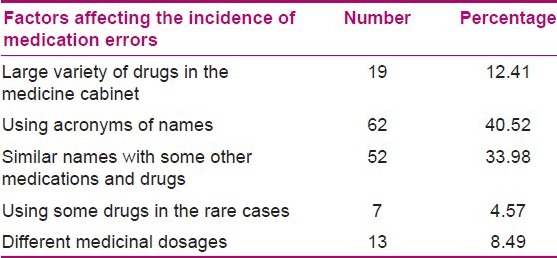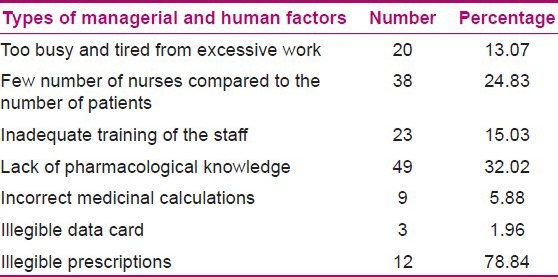Abstract
Background:
The main professional goal of nurses is to provide and improve human health. Medication errors are among the most common health threatening mistakes that affect patient care. Such mistakes are considered as a global problem which increases mortality rates, length of hospital stay, and related costs. This study was conducted to evaluate the types and causes of nursing medication errors.
Materials and Methods:
This cross-sectional study was conducted in 2009. A total number of 237 nurses were randomly selected from nurses working in Imam Khomeini Hospital (Tehran, Iran). They filled out a questionnaire including 10 items on demographic characteristics and 7 items about medication errors. Data were analyzed using descriptive and inferential statistics in SPSS for Windows 16.0.
Results:
Medication errors had been made by 64.55% of the nurses. In addition, 31.37% of the participants reported medication errors on the verge of occurrence. The most common types of reported errors were wrong dosage and infusion rate. The most common causes were using abbreviations instead of full names of drugs and similar names of drugs. Therefore, the most important cause of medication errors was lack of pharmacological knowledge. There were no statistically significant relationships between medication errors and years of working experience, age, and working shifts. However, a significant relationship was found between errors in intravenous injections and gender. Likewise, errors in oral administration were significantly related with number of patients.
Conclusion:
Medication errors are a major problem in nursing. Since most cases of medication errors are not reported by nurses, nursing managers must demonstrate positive responses to nurses who report medication errors in order to improve patient safety.
Keywords: Medicinal errors, nursing profession, reporting, safety
INTRODUCTION
Errors are an integral part of human life. Many errors originate from the natural process of cognitive and behavioral adaptations which develop the correct behavioral skills.[1] Execution of medical orders is an important part of healing process and patient care. It is also the main component of nursing performance and has a prominent role in patient safety.[2,3,4,5] Medication errors can significantly affect patient safety and treatment costs and result in hazards for patients and their families.[6] Giving medicine is probably one of the most critical duties of nurses since the resulting errors may have unintended, serious consequences for the patient.[7,8] Medication errors can lead to adverse outcomes such as increased mortality, increased duration of hospitalization, and increased medical expenses.[9,10] Although medication errors can be caused by all members of health care team, nursing medication errors are the most common.[11,12] The reason is that nurses execute the majority of medical orders and spend about 40% of their time in the hospital to administer medicines.[13] The rates of nursing medication errors are high in both developed and developing countries.[9,10,11,12,13,14] Studies have shown that almost one-third of medicinal complications are due to medication errors.[6] According to previous research, thousands of Americans die due to these errors every year. The financial costs associated with these medical complications have been estimated as $77 million annually.[3] Studies have suggested medication errors to prolong hospital stay by 2 days and to increase costs by $2000-2500 per patient. Inappropriate use of drugs can impose additional hospitalization costs due to adverse medicinal effects and not receiving the required medication.[15] It is difficult to obtain accurate statistics of medication errors since previous studies have indicated that despite the myriad benefits and the moral basis for detection and reporting of errors, nurses hesitate in reporting their errors in order to protect themselves from possible administrative penalties and reactions of patients.[16] In the third world and developing countries, it is almost impossible to find the accurate number of medication errors due to lack of proper archiving and reporting systems as well as the absence of a data registration system. However, according to the increased number of complaints from medical staff to courts and increased judiciary evidence, experts consider the rates of medication errors to be high in the mentioned countries.[17] Determining error types is the first step to prevent errors. As we were also faced with this issue in our clinical observations, we decided to evaluate the viewpoints of nurses about the types and causes of medication errors.
MATERIALS AND METHODS
This cross-sectional descriptive study was conducted in 2009. Participants were randomly selected from nurses with a bachelor's degree in nursing who were working in Imam Khomeini Hospital Complex (affiliated to Tehran University of Medical Sciences, Iran). The inclusion criteria were appropriate physical and mental health status, having at least 6 months of working experience, and willingness to participate. The protocol of the study was approved by the research deputy of the mentioned hospital. On explaining the objectives of the study and reassuring the confidentiality of the collected information, 237 nurses consented to participate.
Data collection tool was a self-made questionnaire which had been prepared and adjusted based on literature review.[17,18,19,20] The questionnaire contained 10 questions about demographic characteristics and 7 specific items about medication errors (types, causes, the most common method, etc.). Nurses with more than one case of medication error had to select only one item. The content validity of the questionnaire had been established by literature review and opinions of experts. The reliability of the questionnaire had been approved by test–retest method (r = 0.9). The questionnaires were anonymous and often filled out by the participants. Data analyses were performed by descriptive statistics (tables, graphs, mean, and standard deviation) and inferential statistics. SPSS for Windows 16.0 (SPSS Inc., Chicago, IL, USA) was used in this study and P values less than 0.05 were considered significant.
RESULTS
Most nurses were females (67.08%), under 30 years old (51.05%), and married (62.02%). More than half of the participants were contract nurses (54.85%) and worked in rotating shifts (71.3%). Moreover, 55.69% of the subjects were working in internal medicine wards and 63.35% of them overworked in one or more hospitals. More than one-third of the participants (43.45%) had attended courses on drug administration.
While a great number of nurses (64.55%) reported medication errors, 31.37% of them reported to be on the verge of a medication error. In addition, 39.86% of the errors had been committed only once. The mean incidence of medication errors for each nurse during the 3-month period of the study was 7.4.
The most common types of reported medication errors were inappropriate dosage and infusion rate [Figure 1]. The most common causes of medication errors were using abbreviations (instead of full names of drugs) in prescriptions and similarities in drug names. Therefore, the most important cause of medication errors was lack of adequate pharmacological information [Tables 1 and 2].
Figure 1.

Frequency distribution of nursing medication errors
Table 1.
Frequency distribution of medical factors affecting the incidence of nursing medication errors

Table 2.
Frequency distribution of managerial and human factors affecting the incidence of nursing medication errors

Most medication errors (60.78%) had been made in intravenous injections of drugs. There were no statistically significant relationships between medication errors and years of working experience, age, and working shifts. However, a significant relationship was observed between frequency of errors in intravenous injections and gender. A significant relation was also found between errors in oral drug administration and number of patients.
DISCUSSION
We found 64.55% of the nurses to have experiences of medication errors. In addition, 39.86% were not repeated. The mean number of medication errors committed by each nurse during the 3-month period of the study was 7.4. In Jordan, Mrayyon et al. reported that at least 42.1% of nurses had committed one medication error and within 3 months. They calculated the mean number of errors of each nurse as 2.2.[11] Lisby et al. performed a study in the hospitals of Denmark and found the rate of nursing medication errors to be lower than what we found.[21] This considerable difference between our findings and rates of medication errors reported in other countries can be due to negative reactions of colleagues, teachers, and administrators after reporting an error,[22] lack of drug monitoring, and absence of a definite medication error reporting and archiving system.[11] However, Iranian managers and executives should know that in order to adopt suitable policies, it is necessary for the nurses to report their errors. Otherwise, inappropriate ethical and treatment decisions will be made.[23] On the other hand, proper planning and a comprehensive system to monitor the process of error reporting can reduce the number of errors and prevent complications.
The most important errors were associated with intravenous injections (60.78%). Kaushal et al. evaluated medication errors in a pediatric hospital and found 61% of the errors to be related with intravenous injections.[24] Although medication errors may be made about any drug, the pharmacological properties or excessive use of some categories of drugs increase the risk of error.[25] Complications of errors in intravenous injections are more than in other methods of drug administration. There have even been reports on the incidence of death and serious injuries following errors in intravenous injection (including wrong drugs, dosage, or dilution).[26]
According to our findings, inadequate pharmacological knowledge was one of the human factors associated with medication errors. Le Grognec et al. suggested lack of awareness and the route of administration to have a significant role in the incidence of medication errors.[27] In contrast, Stratton et al. reported that only 5% of the nursing staff considered lack of knowledge as an effective factor on the incidence of medication errors.[5] Numerous studies have indicated medication errors to be the result of lack of in-service training and inadequate knowledge of nursing graduates.[28,29] Many researchers have recommended increasing pharmacological knowledge of nurses as a strategy to reduce serious medication errors. Therefore, nurses are required to update their knowledge about medicines, especially new drugs.[30]
The results of this study showed that the most common errors were associated with infusion rate and dosage of medicines. In a study in Brazil, the most common types of medication errors were wrong dosage and forgetting to administer medicines.[31] In a study on the incidence of medication errors among British and American nurses, Dean et al. concluded that the most common medication errors were medicine elimination, wrong dosage of medicine, and giving medications without a doctor's prescription.[32] Port et al. conducted an observational study on administration of medication to 336 patients. They detected 485 nursing medication errors including wrong time (36%), wrong method (19%), wrong dosage (15%), and administration of drug without a doctor's prescription (10%).[33]
Our participants stated inadequate number of nurses compared to the number of patients to be among the causes of medication errors. In Saudi Arabia, Dibbi et al. showed that human factors were the most common causes (46.5%) of the incidence of medication errors.[34] Stratton et al. introduced low nurse to patient ratio as the main cause of medication errors.[5] Various studies on the viewpoints of nurses about medication errors have reported crowded and noisy environment, tiredness, lack of adequate support, carelessness, increased workload, and being novice as the most important factors in the incidence of medication errors, particularly in intensive care units.[35]
Obviously, it is absolutely impossible to eliminate all medication errors. However, the role of nursing administrators in reducing and preventing these errors is vital. Although most medication errors can be minor and may not harm the patients, they need more supervision and planning. Reporting medication errors is an ethical duty to maximize the benefits of patient care. It can thus improve patient safety and health. Therefore, managers should have a positive attitude toward the reporting of medication errors by nurses. They should in fact consider error reporting as an opportunity to understand the causes of errors. They will consequently be able to analyze cause and effect relations to establish better policies to prevent errors.
ACKNOWLEDGMENT
The authors are thankful of nurses for their collaboration in this study.
Footnotes
Source of Support: Nil
Conflict of Interest: Nil
REFERENCES
- 1.Marc G. Nursingerror and human nature. J Nurs Law. 2004;9:37–44. [Google Scholar]
- 2.Cheraghi MA, Nikbakhat Nasabadi AR, Mohammad Nejad E, Salari A, Ehsani Kouhi Kheyli SR. Medication Errors Among Nurses in Intensive Care Unites (ICU) J Mazandaran Univ Med Sci. 2012;22(Suppl 1):115–9. [Google Scholar]
- 3.Tang FI, Sheu SJ, Yu S, Wei IL, Chen CH. Nurses relate the contributing factors involved in medication errors. J Clin Nurs. 2007;16:447–55. doi: 10.1111/j.1365-2702.2005.01540.x. [DOI] [PubMed] [Google Scholar]
- 4.Marin HF. Improving patient safety with technology. Int J Med Inform. 2004;73:543–6. doi: 10.1016/j.ijmedinf.2004.05.006. [DOI] [PubMed] [Google Scholar]
- 5.Stratton KM, Blegen MA, Pepper G, Vaughn T. Reporting of medication errors by pediatric nurses. J Pediatr Nurs. 2004;19:385–92. doi: 10.1016/j.pedn.2004.11.007. [DOI] [PubMed] [Google Scholar]
- 6.Hashemi F. Response ethics to nursing errors. J Med Ethic Hist. 2007;4:31–46. [Google Scholar]
- 7.Johnstone MJ, Kanitsaki O. The ethics and practical importance of defining, Distinguishing and discloring errors: A discussion paper. Int J Nurs Stud. 2006;43:367–76. doi: 10.1016/j.ijnurstu.2005.04.010. [DOI] [PubMed] [Google Scholar]
- 8.Wood A, Doan-Johnson S. Executive summaey: Toward-toxonomy of nursing practice errors. Nurs Manage. 2002;33:45–8. doi: 10.1097/00006247-200210000-00020. [DOI] [PubMed] [Google Scholar]
- 9.Mohammadnejad E, Hojjati H, Sharifnia SH, Ehsani SR. Amount and type of medication errors in nursing students in four Tehran. J Med Ethic Hist. 2009;3(Suppl 1):60–9. [Google Scholar]
- 10.Mihailidis A, Krones L, Boger J. Assistive computing devices: A pilot study to explore nurses preference and needs. Comput Inform Nurs. 2006;24:328–36. doi: 10.1097/00024665-200611000-00007. [DOI] [PubMed] [Google Scholar]
- 11.Mrayyon MT, Shishani K, Al-faouri L. Rate, causes and reporting of medication errors in Jordan: Nurses’ perspectives. J Nurs Manag. 2007;15:659–70. doi: 10.1111/j.1365-2834.2007.00724.x. [DOI] [PubMed] [Google Scholar]
- 12.Lehman CU, Conner KG, Cox JM. Preventing provider errors: Online total pareteral nutrition calculater. Pediatrics. 2004;113:748–53. doi: 10.1542/peds.113.4.748. [DOI] [PubMed] [Google Scholar]
- 13.Armitage G, Knapman H. Adverse events in drug administration: A literature review. J Nurs Manag. 2003;11:130–40. doi: 10.1046/j.1365-2834.2003.00359.x. [DOI] [PubMed] [Google Scholar]
- 14.McCarthy AM, Kelly MW, Reed D. Medication administration practices of school nurses. J Sch Health. 2000;70:371–6. doi: 10.1111/j.1746-1561.2000.tb07277.x. [DOI] [PubMed] [Google Scholar]
- 15.Bates DW, Boyle DL, Vander Vliet MB, Schneider J, Leape L. Relationship between medication errors and adverse drug events. J Gen Intern Med. 1995;10:199–205. doi: 10.1007/BF02600255. [DOI] [PubMed] [Google Scholar]
- 16.Mason DJ. To forgive, divine: It is time to drop the veil of secrecy about dislosing errors. Am J Nurs. 2005;105:11. doi: 10.1097/00000446-200512000-00001. [DOI] [PubMed] [Google Scholar]
- 17.Carlton G, Blegen MA. Medication-related errors: A literature review of incidence and antecedents. Annu Rev Nurs Res. 2006;24:19–38. [PubMed] [Google Scholar]
- 18.Brown MM. Managing medication errors by design. Crit Care Nurs Q. 2001;24:77–97. doi: 10.1097/00002727-200111000-00007. [DOI] [PubMed] [Google Scholar]
- 19.Hartly GM, Dillon S. An observational study of the prescribing and administration of intravenous during in a general hospital. Int J Pharm Pract. 1998;8:18–45. [Google Scholar]
- 20.Koohestani HR, Baghcheghi N. Barriers to the reporting of medication adminisraion errors an nursing students. Aust J Adv Nurs. 2010;27:66–74. [Google Scholar]
- 21.Lisby M, Nielsen LP, Mainz J. Errors in the medication process: Frequency, type, and potential clinical consequences. Int J Qual Health Care. 2005;17:15–22. doi: 10.1093/intqhc/mzi015. [DOI] [PubMed] [Google Scholar]
- 22.Osborne J, Blais K, hayes JS. Nurses perception: When is it a medication error. J Nurs Adm. 1999;29:33–8. doi: 10.1097/00005110-199904000-00011. [DOI] [PubMed] [Google Scholar]
- 23.Pinch WJ. Ethical dilemmas in nursing: The role of the nurse and perceptions of autonomy. J Nurs Educ. 1985;24:327–76. doi: 10.3928/0148-4834-19851101-08. [DOI] [PubMed] [Google Scholar]
- 24.Kaushal R, Batas DW, Landrigan C. Mediation errors and adverse drug events in pediatrics in patients. JAMA. 2001;285:2114–20. doi: 10.1001/jama.285.16.2114. [DOI] [PubMed] [Google Scholar]
- 25.Hansen RC, Orit ZE. Medication errors: Why they happen, and how they can be prevented. Am J Nurs. 2005;28:14–24. doi: 10.1097/00000446-200503001-00005. [DOI] [PubMed] [Google Scholar]
- 26.Cousins DH, Sabatier B, Begue D, Schmitt C, Hoppe-Tichy T. Medication errors in intravenous drug preparation and administration: A multicentre audit in the UK, Germany and France. Qual Saf Health Care. 2005;14:190–5. doi: 10.1136/qshc.2003.006676. [DOI] [PMC free article] [PubMed] [Google Scholar]
- 27.Le Grognec C, Lazzarotti A, Marie-Joseph DA, Lorcerie B. Medication errors resulting from drug preparation and administration. Therapie. 2005;60:391–9. doi: 10.2515/therapie:2005057. [DOI] [PubMed] [Google Scholar]
- 28.Pape TM, Guerra DM, Muzquiz M, Bryant JB, Ingram M, Schranner B, et al. Innovative approaches to reducing nurses’ distractions during medication administration. J Contin Educ Nurs. 2005;36:108–16. doi: 10.3928/0022-0124-20050501-08. [DOI] [PubMed] [Google Scholar]
- 29.Anacleto TA, Perini E, Rosa MB, Cesar CC. Medication errors and drug-dispensing systems in a hospital pharmacy. Clinics (Sao Paulo) 2005;60:325–32. doi: 10.1590/s1807-59322005000400011. [DOI] [PubMed] [Google Scholar]
- 30.O’Shea E. Factors contributing to medication errors: A literature review. J Clin Nurs. 1999;8:496–504. doi: 10.1046/j.1365-2702.1999.00284.x. [DOI] [PubMed] [Google Scholar]
- 31.Anselmi M, Peduzzi M, Santos CI. Errors in the administration of intravenous medication in Brazil hospitals. J Clin Nurs. 2007;16:1839–47. doi: 10.1111/j.1365-2702.2007.01834.x. [DOI] [PubMed] [Google Scholar]
- 32.Dean BS, Allan EL, Barner ND, Barker KN. Comprison of medication errors in an American and a British hospital. Am J Health Syst Pharm. 1995;52:2543–9. doi: 10.1093/ajhp/52.22.2543. [DOI] [PubMed] [Google Scholar]
- 33.Port S, Fanton JE, Albertic C. Drug administration errors and their determinants in pediatric inpatients. Int J Qual Health Care. 2005;175:381–9. doi: 10.1093/intqhc/mzi066. [DOI] [PubMed] [Google Scholar]
- 34.Dibbi HM, Al-Abrashy HF, Hussain WA, Fatani MI, Karima TM. Causes and outcome of medication errors in hospitalized patients. Saudi Med J. 2006;27:1489–92. [PubMed] [Google Scholar]
- 35.Haw CM, Dickens G, Stubbs J. A review of medication administration errors reported in a large psychiatric hospital in the United Kingdom. Psychiatr Serv. 2005;56:1610–3. doi: 10.1176/appi.ps.56.12.1610. [DOI] [PubMed] [Google Scholar]


